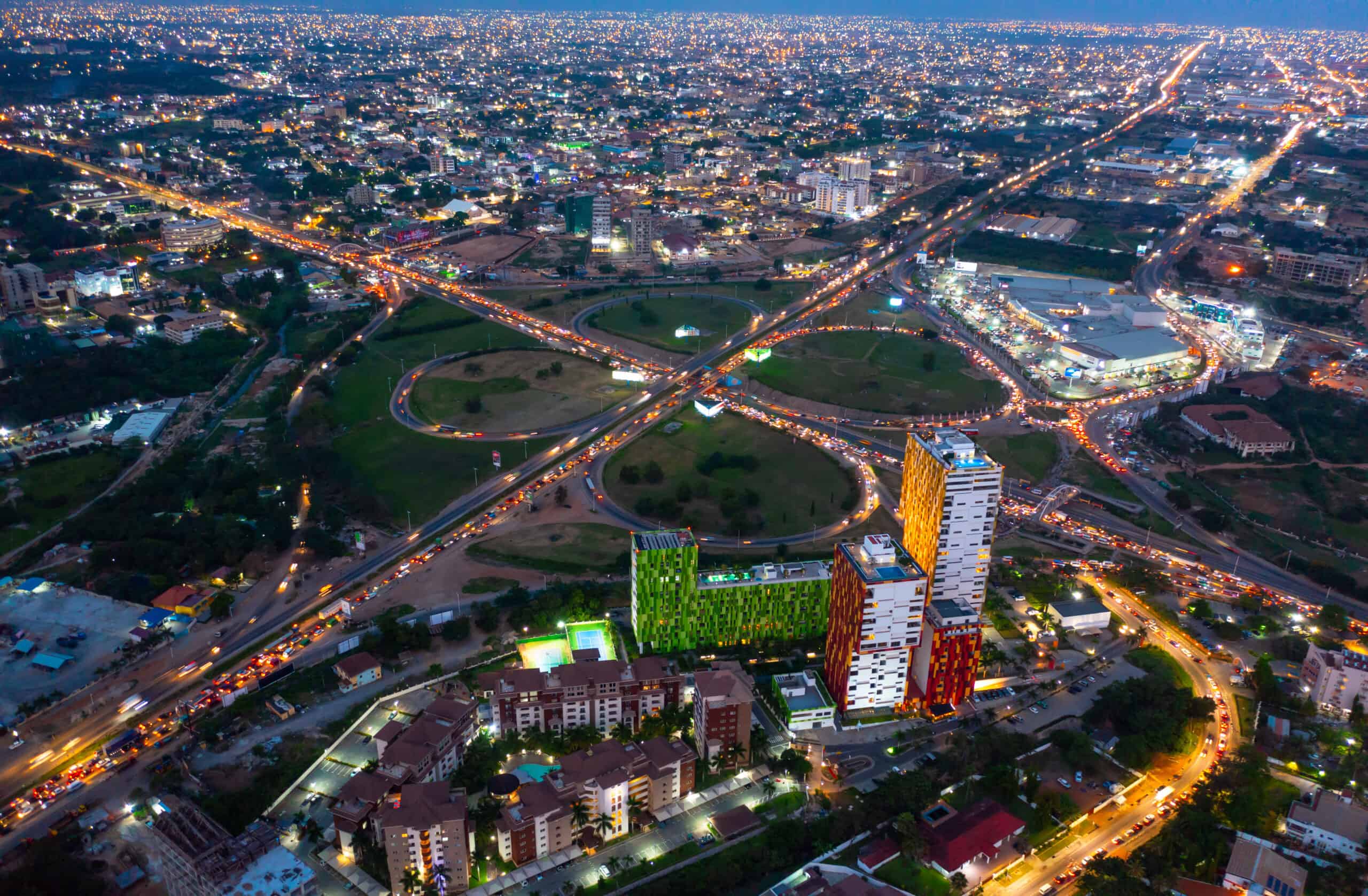Is Ghana a Third World Country? A Comprehensive Overview
Ghana is one of the most culturally rich and diverse countries in West Africa. On top of its vibrant cultures, Ghana is also known for its hospitable people, savory cuisine, and scenic landscapes. But what about the country’s economic status? Is Ghana considered a Third World Country? In this blog, we will debunk the misconception about Ghana’s economic status, and provide a comprehensive guide for travelers interested in exploring this beautiful country.
Is Ghana a Third World Country? A Simple Answer
To put it simply, the term “Third World Country” is outdated and incorrect. The term was originally used during the Cold War to describe countries that were not within either the capitalist NATO bloc or the communist Soviet bloc.
However, as we entered the 21st Century, the term “Third World Country” became a loaded term that had negative connotations of poverty and underdevelopment. Ghana and other countries in Africa (and around the world) have since preferred to use the terms “Developing Country” or “Low to Middle Income Country.”
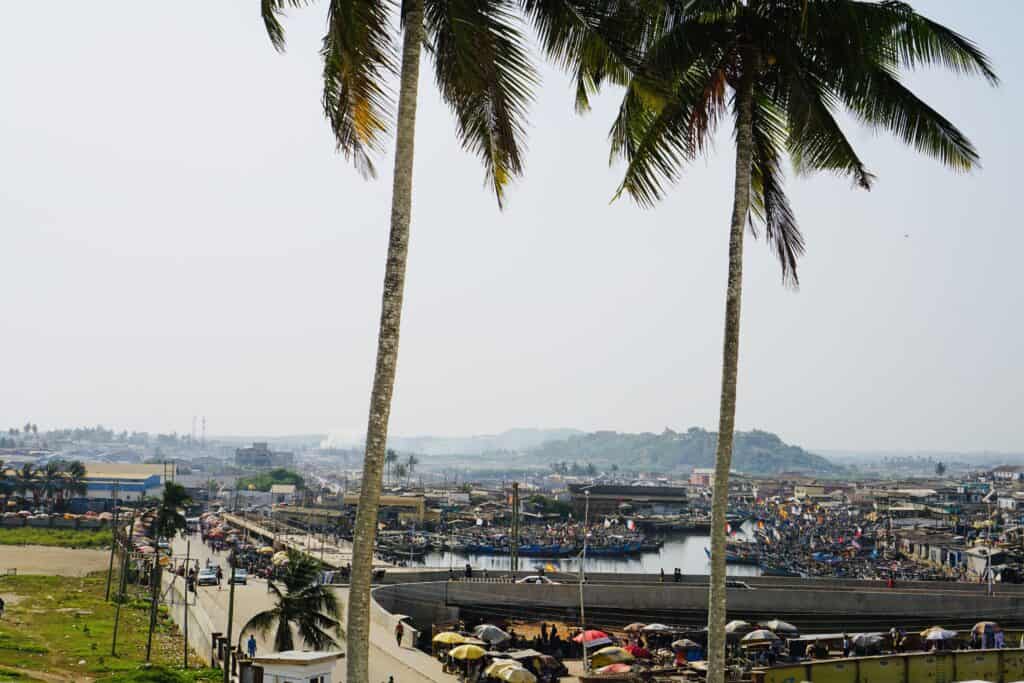
What is a Developing Country?
A Developing Country, also referred to as a low and middle-income country (LMIC), is characterized by its relatively lower standard of living, underdeveloped industrial base, and moderate to low Human Development Index (HDI). Developing countries are in a phase of economic advancement, shifting from agrarian-based economies to more industrial and service-oriented ones.
However, they often face significant challenges, including inadequate infrastructure, poor health and educational systems, and high levels of poverty and income inequality. It’s important to note that the ‘developing’ status does not define the culture, history, or potential of these nations, but is primarily an economic term.
I’ll also note that a large number of countries fall into this designation – 152 of the total 195 UN countries. So essentially the rich countries or those with “first world status” are doing all the defining. I think this provides all the insight you need to know in terms of who is doing the defining and that this term does not paint a full picture of day-to-day life in any country.
An Overview of Ghana’s Socio-Economic Status
What is Ghana’s Classification?
In the case of Ghana, it is classified as a lower-middle-income country when compared to the larger global economy. According to the World Bank, this means that Ghana is a country with per capita income between $1,036 and $4,045. While Ghana still faces its share of economic challenges, the country is rapidly developing its economy and infrastructure. For example, Ghana has experienced an economic growth rate of around 6% in the last few years, which is one of the highest in Africa. The government of Ghana has also been implementing favorable policies to attract foreign investment.
Gross Domestic Product in Ghana
GDP growth as been steadily increasing in recent years, reflecting the country’s increasing economic resilience. According to the World Bank data, Ghana’s GDP was $66.98 billion in 2019, a significant jump from previous years. This equates to a per capita GDP of $2,202, which is notably higher than the Sub-Saharan Africa average of around $1,652.
This sustained economic growth has been driven in part by the services sector, which has overtaken agriculture as the primary GDP contributor. Also, the burgeoning oil and gas industry has spurred growth, with Ghana being one of Africa’s largest oil producers.
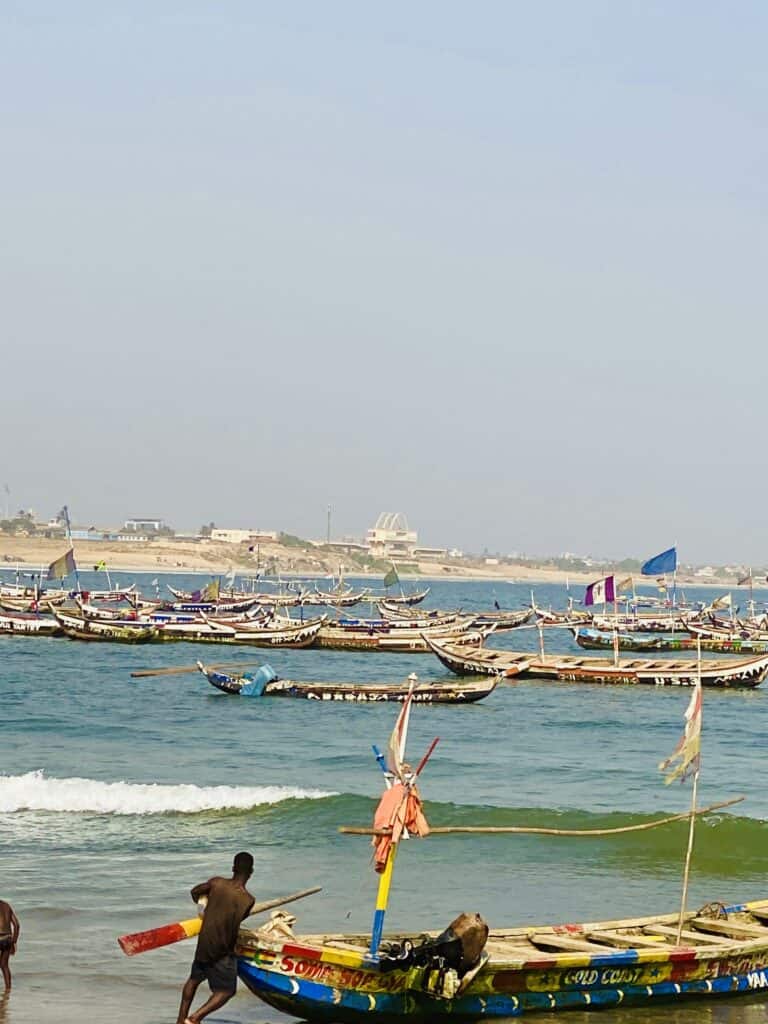
Average Household Income in Ghana
In terms of average household income level, Ghana sits below the world average but shows promising signs of growth. According to the Ghana Statistical Service, the average annual household income in Ghana is approximately 16,956 GHS (around $2,900). This figure takes into account both urban and rural households. However, there are significant disparities among different regions and between urban and rural areas.
The relatively low average income is due in part to a high level of income inequality, another issue that the country is grappling with as it continues to develop. And while it does fall under the category of low-income countries, this is not the whole story and does not give it alignment to the third world countries designation.
I visited both the city (Accra) and the countryside while in Ghana, and it is very easy to see the economic variations there. You may be surprised at some of the high cost food and services you’d find in Accra. Some of those prices are more similar to what you may see in a major US city.
Top Industries in Ghana
Ghana’s economy is characterized by a diverse mix of key industries. The services sector has emerged as the leading contributor to the country’s GDP. This sector encompasses various sub-sectors such as financial services, information technology, telecommunications, and hospitality, reflecting the nation’s development into a services-oriented economy.
Agriculture, once the primary sector, still plays an integral role in Ghana’s economy, providing employment for a vast segment of the population. Key agricultural products include cocoa, which makes Ghana the second-largest global exporter, along with timber and other crops.
The mining and quarrying sector, primarily focused on gold, also wields significant economic influence. Ghana is Africa’s largest gold producer, contributing substantially to the country’s foreign exchange earnings. Additionally, the oil and gas industry has shown rapid growth over the last decade, following significant offshore oil discoveries. Ghana’s oil production is among the top 10 in Africa, placing it on the global energy map.
While these industries drive Ghana’s economic growth, ongoing efforts are aimed at diversifying the economy further to enhance resilience and sustainable development.
Natural Resources in Ghana
Ghana is endowed with an abundant array of natural resources that have significantly influenced its economic trajectory. The country is notably rich in minerals, with substantial deposits of gold, diamond, bauxite, and manganese contributing to its status as a major player in global mineral production. The discovery and development of oil and gas reserves over the last decade have further bolstered Ghana’s resource portfolio.
Forestry and fisheries also form essential components of Ghana’s natural wealth. The lush tropical forests provide valuable timber, while the country’s waters are teeming with a variety of fish species, supporting a vibrant fishing industry.
However, the exploitation of these resources presents both opportunities and challenges. And this exploitation goes back to colonial times. While these resources offer potential for economic growth and development, there is also a need for sustainable management practices to ensure the long-term health of these resources and the environment.
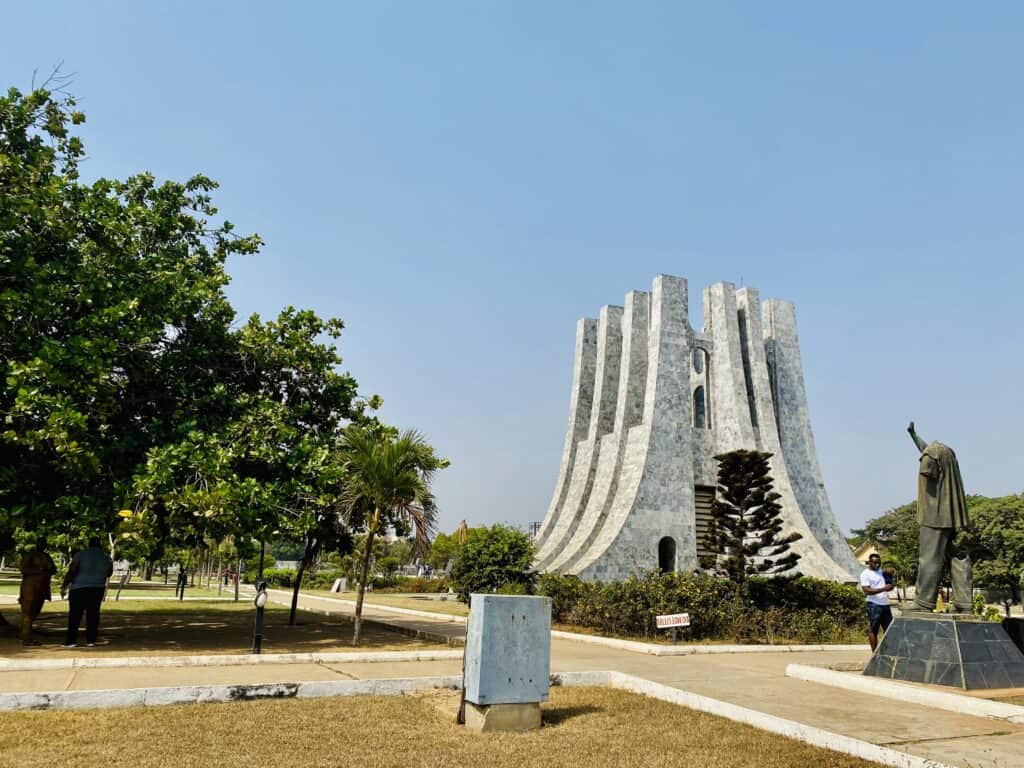
Inflation in Ghana
Inflation has been a significant concern in Ghana’s economic narrative. The rate of inflation has varied over the years, influenced by factors such as fluctuations in global commodity prices, domestic food production, and fiscal policy. High inflation has often led to volatility in the exchange rate and increased the cost of living, impacting the socio-economic conditions of the populace.
However, recent years have seen more stable inflation, thanks to the implementation of stringent monetary policies by the Bank of Ghana. These policies aim to maintain price stability and foster a conducive environment for economic growth. Nevertheless, managing inflation remains a critical issue for the Ghanaian economy, requiring a balanced approach to monetary and fiscal policies.
The International Monetary Fund Outlook on Ghana
The International Monetary Fund (IMF) outlook on Ghana is cautiously optimistic. Despite challenges such as high levels of public debt and persistent vulnerabilities in the financial sector, Ghana’s economy is projected to grow robustly. The expansion is anticipated to be driven by the oil and gas sector, services, and the recovery of the non-oil industry.
The IMF, however, strongly recommends fiscal consolidation and debt sustainability efforts as well as measures to strengthen the financial sector. The Fund also highlights the importance of structural reforms to foster private sector competitiveness and achieve high and inclusive growth. These measures, combined with prudent macroeconomic management, can help transform the outlook for Ghana, enabling it to fully exploit its remarkable potential.
Human Development Index in Ghana
The Human Development Index (HDI) is a key indicator of a nation’s social and economic development, measuring aspects such as life expectancy, education, and per capita income.
As of the latest report, Ghana’s HDI value stood at 0.611 in 2020, which positions the country at 138 out of 189 countries and territories. This places Ghana in the medium human development category.
LIFE EXPECTANCY IN GHANA
According to the latest data from the World Bank, the average life expectancy in Ghana stands at approximately 64 years as of 2019. This figure represents a substantial increase from previous decades, indicating progress in areas such as healthcare and living conditions.
However, there is still a need for continued efforts to further improve life expectancy and overall quality of life for the population. One of these efforts being focused on the current lack of access to good medical care, which contributes to individual health problems.
INFANT MORTALITY IN GHANA
High infant mortality remains a significant concern in Ghana. The World Bank data indicates that in 2019, the infant mortality rate was approximately 37 deaths per 1,000 live births, a figure that, while showing some improvement from past years, still underscores the need for heightened focus on maternal and child health, and easier access to such care. Main contributors to infant mortality include preventable diseases, malnutrition, and inadequate prenatal and postnatal care.
The Ghanaian government, in partnership with various international organizations, is striving to reduce these numbers through initiatives aimed at improving universal access to quality healthcare for mothers and infants, boosting nutritional intake, and increasing awareness about the importance of prenatal and postnatal care.
EDUCATION IN GHANA
Education is a critical sector in Ghana, with the government continually emphasizing the need for quality and accessible education for all citizens. The country’s education system is structured into basic, secondary and tertiary levels. Basic education, comprising kindergarten, primary, and junior high school, is free and compulsory.
In terms of literacy rate, Ghana exhibits progress. According to the latest survey from the Ghana Statistical Service, the literacy rate among persons 15 years and above stands at approximately 79%. This signifies that a significant portion of the population has the basic literacy skills required for daily life and work.
Despite these advancements, challenges persist in the education sector. These include limited resources, disparities in access between urban and rural areas, and high dropout rates, especially among girls. The government, alongside various non-governmental organizations, is working to address these issues and further improve the state of education in Ghana.
POVERTY IN GHANA
Despite significant strides in economic growth and developmental indices over the years, poverty (at times, extreme poverty) remains a pertinent issue in Ghana. The World Bank reports that approximately 24% of the population live below the poverty line, with a higher incidence in rural areas where access to basic amenities such as clean water, healthcare, and quality education is limited. Poverty in Ghana is characterized by low income, food insecurity, inadequate housing, and limited access to social protection mechanisms.
The government of Ghana, in partnership with international organizations like the World Bank and the United Nations, is implementing various poverty alleviation strategies including strengthening social protection systems, enhancing the accessibility of quality education, and promoting sustainable agricultural practices among rural farmers. Despite these efforts, a comprehensive and inclusive approach is required to fully eradicate poverty and inequality in Ghana.
Ghana Compared to Other Countries in Africa
When juxtaposed with other nations in Africa, Ghana’s economic performance is quite commendable. With an impressive growth rate of around 6%, Ghana outpaces several of its African counterparts. For example, according to the African Development Bank, the average growth rate for Sub-Saharan Africa in 2019 was approximately 3.4%. It is behind countries such as South Africa, but doing quite well regionally.
Ghana’s GDP of $66.98 billion also places it among the top 15 economies in Africa, well ahead of many others. It is one of the fastest-growing economies in the continent. In terms of oil production, Ghana ranks among the top 10 in Africa, which has significantly contributed to its economic growth.
However, the poverty level remains a concern, as it does in many African countries, demonstrating the shared challenge of ensuring that economic growth translates into improved living standards for all citizens.
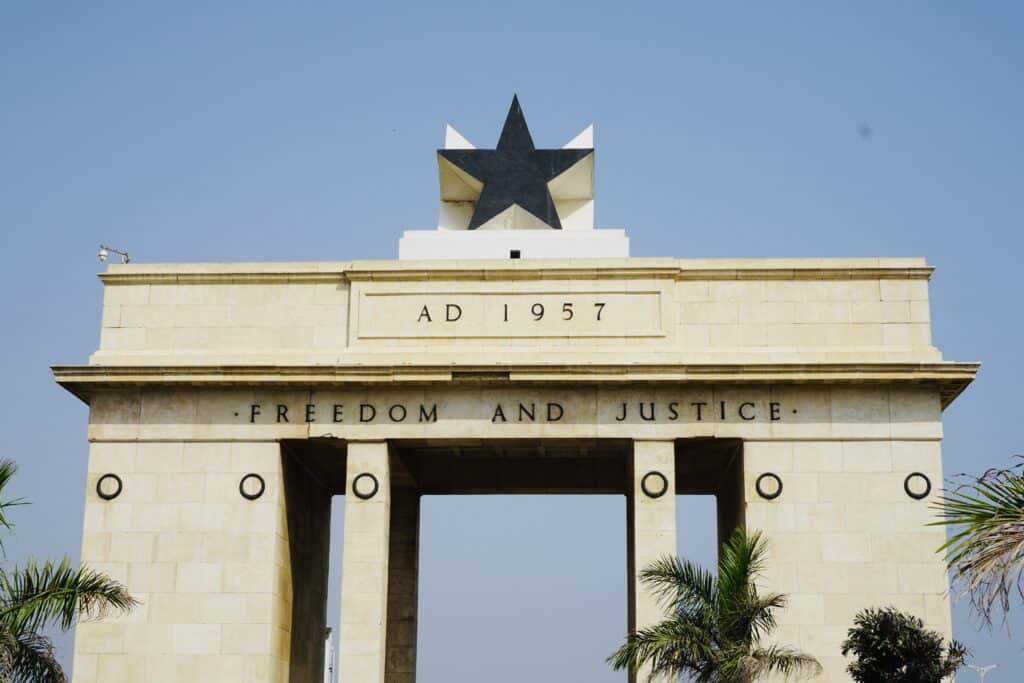
Political Stability in Ghana
Ghana is often hailed as a beacon of stability in the West African region, demonstrating consistent democratic governance since 1992. The country has successfully conducted seven peaceful transitions of power, showing a strong commitment to democratic values.
This political stability has undoubtedly played a significant role in Ghana’s economic progress, attracting foreign investments and facilitating development. While there are no major political instability concerns, challenges such as corruption and the need for institutional reform linger. The government must tackle to maintain this stability and foster further growth.
What is the History of Ghana?
Ghana, often referred to as the “Gold Coast”, has a rich history that dates back to ancient times. It was home to several prominent medieval West African kingdoms, such as the Ashanti Empire, the Fante Confederacy, and the kingdoms of Akwamu and Bonoman.
These kingdoms played pivotal roles in regional trade, especially in gold, ivory, and slaves, establishing Ghana as a prosperous trade hub. The Ashanti Empire, in particular, was known for its military prowess and golden wealth, which attracted European explorers and traders to the region.
The modern history of Ghana begins with the arrival of the Europeans in the 15th century, primarily the Portuguese, followed by the Dutch, the Danes, and the British. Initially interested in the trade of gold and spices, these powers soon turned their attention to the slave trade, which had devastating effects on the region.
In the 19th century, the British emerged as the dominant power and officially declared the Gold Coast a British colony in 1874. The struggle for independence began in the early 20th century, led by notable figures such as Kwame Nkrumah. Nkrumah went on to become the founding father of that nation. Eventually, Ghana became the first country in sub-Saharan Africa to achieve independence from colonial rule on March 6, 1957.
The Impact of Colonialism on Ghana
The colonial past of Ghana has significantly shaped its socio-economic status today. The country’s background as a prosperous trade hub established a foundation for a robust economy that thrives on exports, particularly gold, cocoa, and oil. However, the devastating effects of the slave trade and colonial rule provoked a significant setback, contributing to disparities in wealth and lingering socio-economic challenges.
The struggle for independence and the leadership of figures like Kwame Nkrumah ignited a sense of nationalism and self-reliance, leading to policies aimed at economic self-sufficiency. Post-independence, efforts were made towards industrialization and education, which have played a crucial role in Ghana’s current economic development.
Nevertheless, Ghana, like many African nations, continues to grapple with the challenge of ensuring that economic growth benefits all citizens equitably. Poverty remains relatively high, a legacy of historical injustices and a reflection of the ongoing struggle to create an inclusive growth model that effectively addresses disparities. The history of Ghana serves as a lens through which to understand its present socio-economic dynamics and the efforts needed to ensure a prosperous future for all Ghanaians.
What is the Culture Like in Ghana?
The culture of Ghana is deeply rooted in tradition, with each ethnic group boasting its own unique folklore, language, and customs. These traditions often find expression in the country’s vibrant music and dance forms. Highlife and Hiplife music, for instance, are widely popular across the nation and even beyond its borders. Both genres blend traditional rhythms with modern influences, encapsulating Ghana’s dynamic cultural identity.
Traditional dance forms such as Adowa, Kpanlogo, and Borborbor reflect the rich tapestry of Ghana’s cultural heritage, each dance telling its own story and serving its own social function.
Ghanaian cuisine is another significant aspect of the country’s cultural landscape, offering a diverse array of dishes that reflect its multicultural makeup. Staple food items include cassava, yam, maize, and plantain, which are typically served with a variety of flavorful sauces and soups.
Jollof rice, a one-pot rice dish that is a subject of friendly rivalry between Ghana and Nigeria, is a must-try. The bustling markets of Accra, Kumasi, and other cities offer an authentic taste of Ghana’s culinary diversity, providing a sensory journey into the heart of the nation’s culture.
Is Ghana Worth Visiting?
One of the most fascinating aspects of Ghana is its cultural diversity. With over 100 different ethnic groups, Ghana has a unique and dynamic cultural scene. From the colorful festivals of the Akan people, to the drumming and dancing of the Ewe people, to the history of the Ashanti empire, there is so much to explore and learn in Ghana.
Ghana is also home to several UNESCO World Heritage Sites, including the coastal forts and castles that were used in the transatlantic slave trade, as well as the Assin Manso slave river.

Another reason to visit Ghana is for its nature and wildlife. Ghana has several national parks and reserves, including Mole National Park, Kakum National Park, and Bia National Park.
These parks are home to several species of primates, elephants, antelopes, and other wildlife. If you’re interested in eco-tourism and responsible travel, Ghana is a great destination to explore.
TOURISM INFRASTRUCTURE IN GHANA
Ghana’s tourism infrastructure is continually developing, providing essential facilities to ensure a pleasing experience for visitors. The country boasts a range of accommodations, from luxury hotels in the urban centers of Accra and Kumasi, to budget-friendly guesthouses and eco-lodges in more remote areas.
Transport links are also well-established, with internal flights, reliable road networks, and an extensive bus system available for getting around. Notably, Kotoka International Airport in Accra serves as a primary gateway for international travelers.
Regarding amenities, numerous restaurants offer both local and international cuisines, and there are several tourist information centers available. However, it’s worth noting that facilities may be more basic in rural and wilderness areas compared to the cities.
IS IT SAFE TO TRAVEL TO GHANA?
When it comes to safety, Ghana is generally a safe country to travel to. Violent crime and theft are relatively low compared to other countries in West Africa. However, as with any country, travelers should always exercise caution and common sense, especially when traveling alone or at night. It is also advisable to follow the local customs and dress modestly in rural areas.
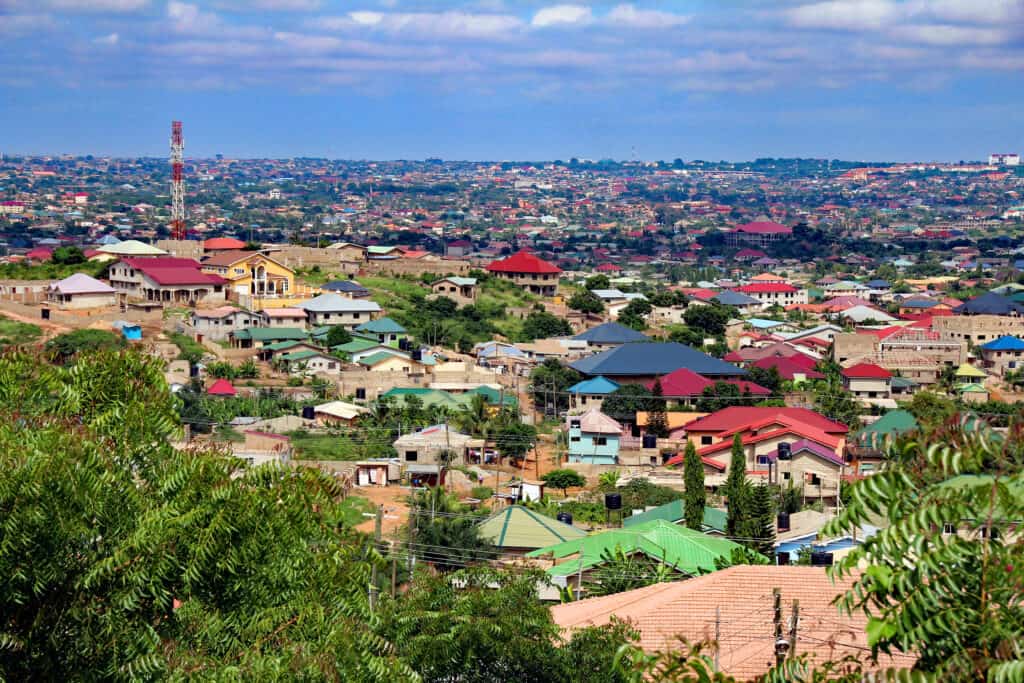
Frequently Asked Questions About Ghana
Ghana is considered a lower-middle-income country according to the World Bank, with pockets of relative wealth alongside areas of poverty.
The religious landscape of Ghana is diverse, featuring a majority of Christians, a significant Muslim minority, and many practicing traditional African religions.
The term “third-world” was historically used during the Cold War to reference countries that were not aligned with either the capitalist “first world” or the communist “second world”, but has since evolved to broadly refer to less economically developed countries, a categorization that oversimplifies Africa’s diverse nations.
Ghana is best known for its rich cultural heritage, historical coastal forts related to the transatlantic slave trade, diverse wildlife in its national parks, and as a major producer of gold and cocoa.
Is Ghana a Third World Country? | A Summary
In summary, Ghana is not a Third World Country, but rather a developing country with a rapidly growing economy, rich cultural heritage, and beautiful natural attractions. As you can see from this post, Ghana is not even one of the least developed countries or one of the poorest countries in Africa.
Ghana is a great destination for travelers interested in history, culture, nature, or just looking to have an unforgettable adventure. By planning your trip carefully and following local customs and guidelines, you can have a safe and enjoyafble experience in Ghana.

